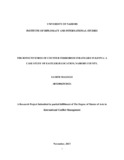| dc.description.abstract | The world today faces a common problem which is terrorism. Countries continue to formulate counter terrorism strategies nevertheless; terrorism is still an issue being contended with. Although Kenya boasts of the most stable, effective and democratic government compared to all the countries in the Horn of Africa, the country in most recent years has experienced the most terrorist attacks which are a challenge to both intelligence and security services. Eastleigh particularly has been determined to be one of the sources of these terror attacks as it harbours most potential terrorists. Although counter terrorism strategies have been placed to provide a sense of assurance that the country is secure, their effectiveness may not be easily assessed. The study therefore, sought to determine the effectiveness of counter terrorism strategies in Kenya with particular focus on Eastleigh Location in Kamukunji Sub-county. The objectives of the study included to identify and analyse the counter terrorism strategies adopted by security organs in Eastleigh, examine the challenges in the implementation of established counter terrorism strategies in Eastleigh and how to curb the challenges of counterterrorism strategies. The study adopts the descriptive research design and data was analysed by descriptive statistics. The study finds out the main strategies used to be risk management strategies, police operations, intelligence services and random searches and raids. The study also finds that there are challenges which pose a limitation to how effective the counter terrorism strategies are in Eastleigh region; inadequate funds, inadequate training, increased youth radicalization and lack of public support. The study further looks at measures which may be incorporated in curbing the challenges experienced in countering terrorism such as; training, modernization, implementing counter terrorism laws and policies and increased public participation. The study thus concludes that to prevent conflicts and by extension terrorism then priority must be given in addressing underlying root causes of conflicts. The study recommends that the security agents should put measures to ensure increased public participation in countering terrorism. The study also recommends that Kenya and other relevant stakeholders should come up with National Counter Violent Extremism and Terrorism plans which should reflect a multiagency approach within government, NGOs, civil societies and general and affected-communities. | en_US |



